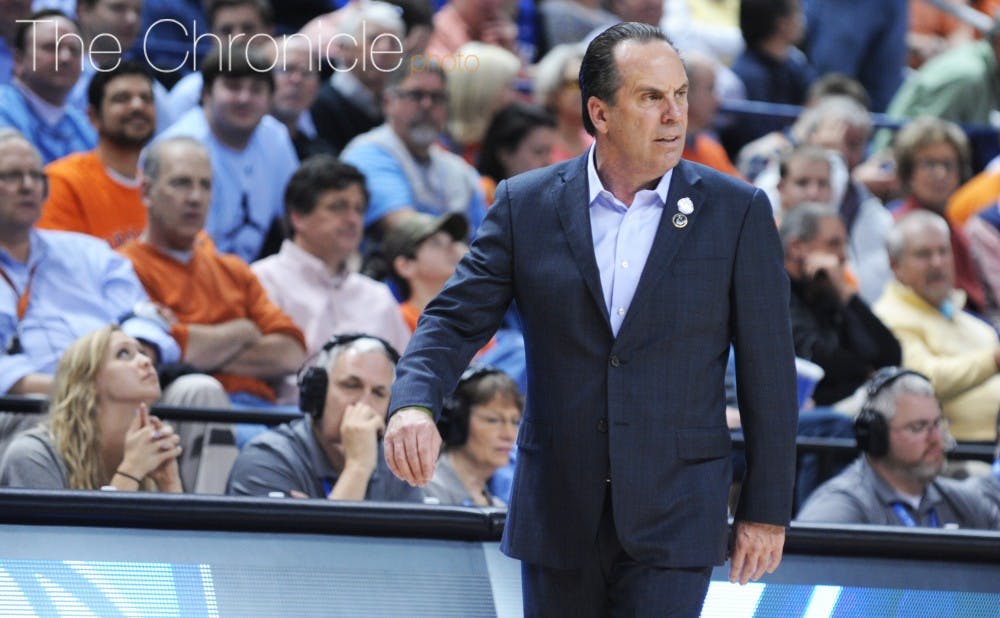Clemson may sit atop the most recent edition of the College Football Playoff rankings, but mid-November brings a new sense of excitement in the ACC—the start of basketball season.
Three of the league's teams begin the season ranked inside the top six, a year after the ACC advanced three teams to the Elite Eight. Coaches at last month's media day in Charlotte, N.C., said this year's league could be the most competitive in history.
But ACC Commissioner John Swofford wants more done to generate enthusiasm nationwide.
"I'd love to see more excitement and buzz given to the start of college basketball like we see in so many other sports," Swofford said during a commissioner's forum at media day Oct. 28. "The ending [March Madness] is climactic, as we all know. The beginning, not so much. Is there a better way to celebrate the opening of the season in college basketball?"
Swofford noted that the ACC, as one of the top basketball conferences in the country, can play a role in leading discussions with its fellow NCAA members to pursue alterations to the college game.
One idea that has been batted around is having every team open the season on the same day, creating the Opening Day and Week 1 model currently used to great success by Major League Baseball and the National Football League. Currently, teams play their first game throughout the course of this weekend, occasionally at odd times to accommodate ESPN's tip-off marathon. By focusing attention on college basketball for a single day, the thinking goes, the sport could carve out a national day of recognition without having to compete with a meaningful college football Saturday as the season heads into the stretch run or an ever-popular NFL Sunday.
North Carolina head coach Roy Williams pointed to Virginia—the two-time defending regular season ACC champion—as a reason why college basketball must generate more attention throughout the regular season, not just on a hypothetical Opening Day and for the month of March.
"[Virginia] was the best team in our league, and people forget that because somebody else won the ACC tournament. I always think what you do in those two-and-a-half to three months is more important than what you do in three days or four days or five days or six now," Williams said at media day. "I wish the regular season meant even more. I wish the regular-season winner got the automatic bye [to the NCAA tournament]."
Swofford cast doubt on another idea that would condense the season into just the spring semester, so as not to compete with college football. Duke head coach Mike Krzyzewski called a potential shift to a one-semester sport "a real mistake" because of its effect on the sport's marquee event and the academic calendar.
"College basketball owns March. No sport infringes on that," Krzyzewski said. "There's hardly any sport that owns a month—we own March. To say that it's going to be April Madness...why risk that?"
After Louisville joined the conference last year to bring the number of members to 15, the ACC will also have to take a look at the way it develops its league schedule. With an 18-game schedule, each team only plays four repeat opponents, creating an unbalanced schedule. Historically, the league has preserved Duke's home-and-home series with North Carolina and Wake Forest twice, but a shake-up to formatting—either randomizing repeat opponents or increasing the number of total conference games—could change that.
As a member of the Big East, Notre Dame underwent some of those changes as the conference transformed into a league that got 11 NCAA tournament bids in 2011.
"I think there’s some strategy to how you set up your regular-season league schedule, which is under discussion. Do we still keep our permanent repeat opponents? Does that change? Is that flexible every year? That’s what happened in the Big East. I think that had a big hand in us getting 50 percent of our league in [to the tournament] regularly," Notre Dame head coach Mike Brey said. "There’s a strategy to how you set up…. It’s not just like, ‘Hey, we’ve got better teams, so we’re going to get eight in.'"
Not all the issues at hand for the ACC—and the NCAA overall—revolve around schedules.
College basketball instituted 31 rule changes during the offseason, but Swofford and Krzyzewski have talked about going even further, such as reducing the new 30-second shot clock to the NBA-regulation 24.
"Should we consider the quarter system? Should we consider advancing the ball to the front court when a team takes a timeout in the last two minutes of the game? Is there merit to moving to six fouls before a player is disqualified?" Swofford said.
The commissioner also advocated for a new NCAA model regarding entry into the NBA draft that adheres to the same system in place with the MLB. Under those rules, a player can either turn pro right after high school or head to college with the requirement that he must then remain in college for three years.
College football players are also only eligible to leave for the NFL after three years. Such a model for college basketball would require extensive conversations between the NCAA, NBA and other impacted parties, after the NBA barred high school players from entering the draft back in 2005.
None of these changes will be made during the upcoming season, but the table is set for future conversations, and the ACC will have a place at that table.
"The ACC should play the role of a leader in the game. I'm not saying the only leader—that'd be disrespectful to the Big Ten and all the other conferences," Krzyzewski said. "We've had a great tradition in our conference and we should be a care-taker for the game, a guardian of the game."
Get The Chronicle straight to your inbox
Signup for our weekly newsletter. Cancel at any time.

